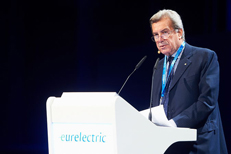
Welcoming over 400 delegates to the EURELECTRIC Annual Convention, Fulvio Conti, EURELECTRIC President and CEO of ENEL, stressed that the power sector was currently "on the cliff edge" as it was facing numerous regulatory and financial challenges. The energy sector was faced with increasing policy demands but electricity companies were having problems raising the necessary capital. A clear and stable long-term regulatory framework was key for the power sector to secure the large investments needed.
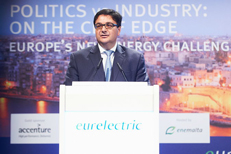
In his welcoming words, Tonio Fenech, Maltese Minister of Finance, the Economy and Investment, outlined the key role of energy development in promoting security, sustainability and economic growth. Malta was firmly committed to reaching the target of 10% renewables (RES) of energy consumption in 2020. But new investments were needed to help electricity prices reach more reasonable and stable levels in the coming years, he said, pointing to the plan to connect Malta with the European grid by means of an interconnector with Sicily.
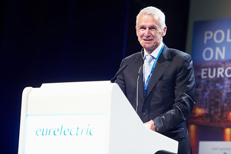
Speaking on behalf of EU Energy Commissioner Günther Oettinger, Philip Lowe, Director General of the European Commission's DG Energy, outlined the role of policymakers and industry stakeholders in ensuring a secure, sustainable and competitive supply of energy. He recalled some of the actions undertaken at EU level to reach that goal, including state aid and competition rules, the Third Energy Liberalisation Package and the work done on transparency and integrity of energy markets. No more regulation was needed, he told delegates: "We do not need a fourth package - we should let the market work!" Ensuring disciplined public intervention was key: if such an intervention was needed in the energy markets, it should be market-based, proportionate to the goal pursued and transitional.
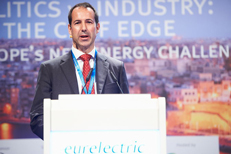
The first SESSION, moderated by Guy Turner, Director for Commodity Market Research at Bloomberg New Energy Finance, focused on the energy challenges from a global perspective. Speakers shared views from Europe and the US and discussed how to ensure sustainable energy access around the globe.
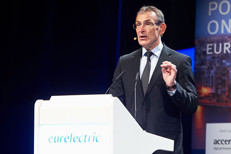
Andris Piebalgs, EU Commissioner for Development and formerly in charge of energy, invited delegates to look at energy challenges beyond Europe's borders. "Energy is a fundamental right […] and a precondition for growth and development," he stressed. Ensuring access to electricity for the 1.3 billion people still without it was a key priority for the European Commission, which was therefore strongly supporting the UN's Sustainable Energy for All initiative. But there was also a role for industry: "the private sector should be with us every step of the way." He thanked EURELECTRIC for its support in this area and stressed the huge opportunities that investments in developing countries represented for energy companies: "I ask you to do what you do best: seek opportunities, be innovative and look into the future."
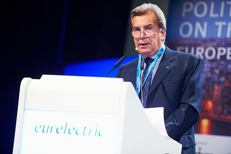
Picking up from Commissioner Piebalgs, Fulvio
Conti, EURELECTRIC President and CEO of ENEL, stressed
EURELECTRIC's continued commitment to universal energy access for
all. At the same time, the electricity industry was facing serious
challenges: the last twelve months had seen the collapse of
financial markets with its corresponding low and even negative GDP
growth, the continued effects of Fukushima, as well as new
challenges arising from the increased share of intermittent RES.
"We are facing our biggest challenge of the last few decades on the
way into an unknown future. It is time to be inventive, innovative
and brave," he said. Three key preconditions were needed to put the
sector back on track: a coherent EU structure with the EU ETS as
the umbrella policy for decarbonisation, an integrated European
market, and innovation.
Mr Conti's full speech is available here.
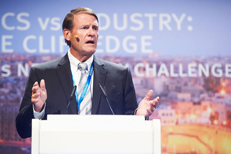
Michael G. Morris, Chairman of the Board of American Electric Power, pointed out the similarities between Europe and the US where there are 50 states taking different directions with additional interventions from the federal government. He spoke out in favour of a balanced electricity mix of RES, coal, nuclear, natural gas and energy efficiency. Technology development and back-up sources would be needed to cope with the intermittency of many RES technologies, while coal was not out of the picture, according to recent statements from the White House. Nor could nuclear simply be taken out of the equation. Regarding energy efficiency he argued that the price was a more efficient driver in reducing consumption than governments. "Please give us a set of rules and let us be," he concluded.
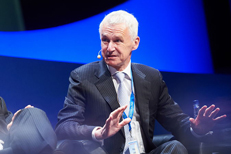
Speaking in the ensuing panel debate, Philip Lowe, Director General of the Commission's DG Energy, said that the main reason why the electricity sector had become "un-investable" was not the excess of regulation but the impact of the financial crisis itself, including low growth and the sovereign debt crisis. On the issue of RES subsidies, he stressed the need for a harmonised European framework for RES public support and the need to stop the "messy interventions by 27 different member states that leads to chaos." "The prerogative for member states to choose their own energy mix is wrong. […] The Commission should be tough on member states that are distorting the market by subsidising RES and regulating retail electricity prices," he concluded.
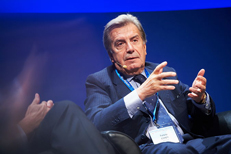
Fulvio Conti, EURELECTRIC President and CEO of ENEL, stressed that electricity utilities had been focused mainly on keeping existing assets. Now there was a new paradigm where RES were close to grid parity in Europe and our clients were deploying "smarter" tools. Utilities needed to think differently and be promoters of technological improvement. Moreover electricity utilities were willing to invest but a stable regulatory framework was a prerequisite, he said. Cases like the tariff deficit and government intervention in the Spanish electricity tariff should be avoided. Infrastructure was crucially needed - as an example he highlighted the case of Italy where construction for a new regasification unit was about to start after 25 years of waiting for authorisation.
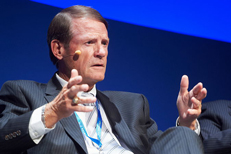
Michael G. Morris, Chairman of the Board of American Electric Power, clarified that while old nuclear assets produced very cheap energy, new nuclear generation assets were tremendously expensive, with investment costs rising to around 7,000 dollars/KW. As in Europe, the US was in an overcapacity scenario, but continued investment was needed to ensure that the lights did not go out one day in the future. "Capacity charges are essential to build new generation capacity," he said.
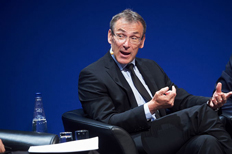
Commenting on concerns that the low degree of investment could pose a threat to the adequacy of the system, EU Commissioner for Development Andris Piebalgs stressed that concerns on security of supply had decreased, with the discovery of shale gas changing the picture. Investment in interconnections and the promotion of more competitive markets were nevertheless key to ensure security of supply.
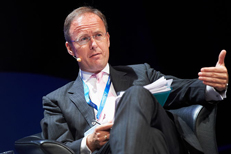
Dominik Thumfart, Managing Director and Co-Head of Infrastructure & Renewable Energy Finance at Deutsche Bank, pointed out that the unstable regulatory framework in Europe was currently discouraging new investments, to the extent that Asian sources of capital were more willing to invest in America than in Europe. Costs of renewables needed to come down; renewables needed to become more competitive.
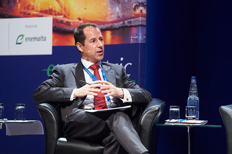
Summing up the panel debate, Guy Turner, Director for Commodity Market Research at Bloomberg New Energy Finance, concluded that the un-investibility of the electricity sector was less due to excess of regulation than the current economic and financial situation of the European economy. He added that, for the moment, adequate capacity was still available. However, electricity demand would certainly grow and our sector would have to develop new innovative investment models to adapt to this situation. He also stressed the common call of the energy sector in Europe and the US for a stable, consistent and long-term regulatory framework to allow companies to deliver the sizeable investments needed.
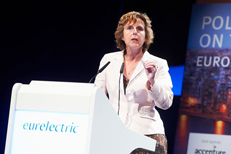
Connie Hedegaard, European Commissioner for Climate Action, opened SESSION II with her keynote speech "Mapping the Road to Green Success: Reconciling the Different Targets". She made the case for setting 2030 to 2050 emission reduction milestones, arguing that delaying the decision would be even more costly. A complementary framework was needed to promote RD&D and investment in infrastructures. Moving to the ETS, she argued that the system was in fact working, delivering emissions reductions across half of the economy. However, she acknowledged that the ETS had been expected to drive investments in low-carbon technologies, which the current low price was not delivering. The economic crisis had created a surplus of unused allowances, whose magnitude raised the issue of whether some structural changes would be needed. Agreeing on such changes would take time. Nevertheless, "if we want the ETS to be the key driver, we need to ensure it will give the right investment signal, and we have to do it now."
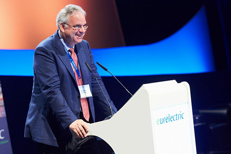
In his keynote speech on "Getting the Supply Side Right: Is Carbon the Driver?", Johannes Teyssen, Vice President of EURELECTRIC and CEO of E.ON AG, clearly stated the reasons for supporting the ETS: it's European, it's a market-based instrument and it drives innovation. "But I believe the current state of the ETS is devastating: it is bust. The system just tells you 'let's take a break for eight years and then meet in 2020 to see what needs to be done.'" This was because the carbon price did not take note of developments in other policies such as energy efficiency and renewables (RES). The carbon abatement investments were not based on carbon, but on other policies that were much more remunerated. "The result is left to the consumers, who pay more and more, and with industries that are more and more nervous." The message for the European Commission was clear: don't wait until 2020 to fix the system. "We share the ambition, we share the general pathway. But we're concerned about the current status. More drastic medicine is needed. We need to fight for the right instrument, the right pathway. And this has to start as of now."
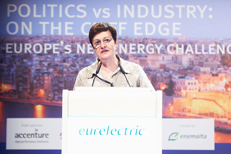
In her speech, Michèle Bellon, Chair of the EURELECTRIC DSO Directors' Gathering and CEO of ERDF, asked how smart Europe's grids would need to be. "The challenge for distribution system operators (DSOs) will be at the core of the electricity system, as they will be market enablers responsible for setting up the playing field," she highlighted. Distribution networks had to be made fit to integrate large amounts of distributed generation, thereby safeguarding the safe operation of the system, she explained. "This implies higher investments for DSOs and the necessity to deploy new ICT solutions," she stressed, calling for the development of "the right business models where all parties share the risks, cost and benefits of smart grids."
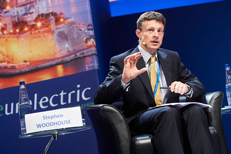
In his introduction to the panel debate, moderator Stephen Woodhouse, Director at Pöyry Management Consulting, asked panellists whether it was credible that we would soon move to a world where RES would be market-ready without any government involvement in markets. Did they believe that RES would truly become part of the energy mix or would other instruments be needed?
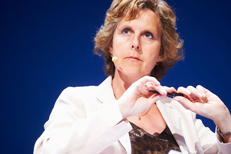
Connie Hedegaard, European Commissioner for Climate Action, responded positively to the results of the e-voting, which showed a strong and growing support for the ETS over the last year. She agreed that Europe needed a variety of tools to promote low-carbon investments and innovation, but she agreed that they all needed to fit together. She also commented on the industry's expectation to have commitments from other developed and developing countries on 2020 emission reduction targets, encouraging the industry to continue working within the International Electricity Partnership to raise awareness among governments.
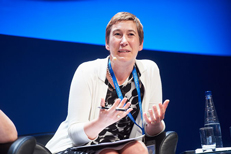
Inge Bernaerts, Head of Unit for Wholesale Markets, Electricity and Gas at the European Commission's DG Energy, emphasised that flexibility - be it storage or demand response - was becoming more and more important and had to be rewarded. "The true value of energy should be reflected in the market in every timeframe, not only on day-ahead markets," she declared. Further elaborating on the integration of RES into the market, she added that "it is not only the European Commission who makes policy, but it's about having the whole industry cooperating to cost-efficiently deal with the issue using the right instruments like the network codes."
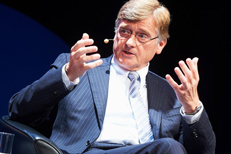
Speaking on behalf of European transmission system operators (TSOs), Daniel Dobbeni, President of ENTSO-E, stressed that the future market model needed to be aligned with the necessary investments in the transmission and distribution infrastructure. "For the past decade we have been missing the synchronisation between the 'software' and the 'hardware' of our power system," he underlined. "From a European TSO perspective, regulation should support the way we take the risk to make cross-border investments," he said, adding that "cooperation with DSOs will become more important to optimise the European power system approach."
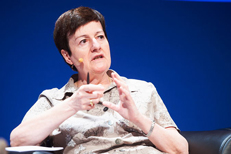
"DSOs should be able to manage the grid," commented Michèle Bellon, Chair of the EURELECTRIC DSO Directors' Gathering. The right technological tools such as smart meters would allow DSOs to keep the local system overview that could support markets to further invest in renewables, she explained. "But DSOs need long-term financial visibility over a much longer timeframe than the four-year regulatory frameworks that are in place in most parts of Europe," she concluded.
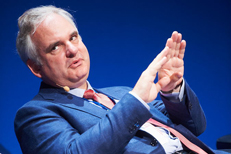
Coming back to the issue of policy coherence, Johannes Teyssen, Vice President of EURELECTRIC and CEO of E.ON AG, raised a key question: "How do you actually match policies so that they can fit with each other?" He stressed the need to focus on markets and promote their proper functioning. He also sounded a warning note about the continuous stream of regulation. "One thing is clear: electricity companies cannot invest if member states try to regulate every single detail of our business, often even going against EU regulation. Investors sense it, and react accordingly."




